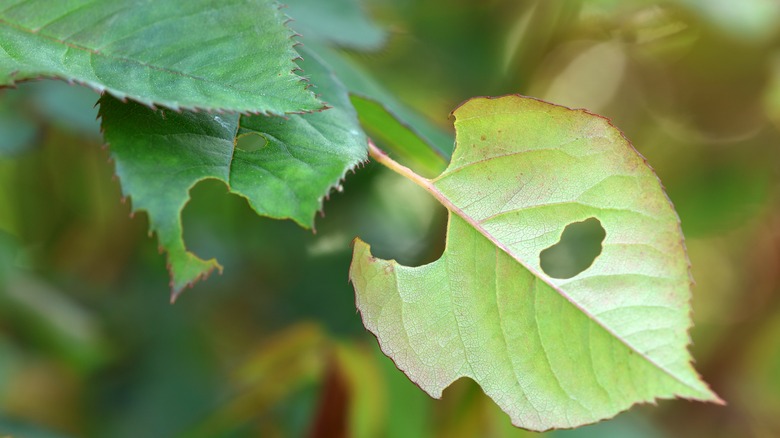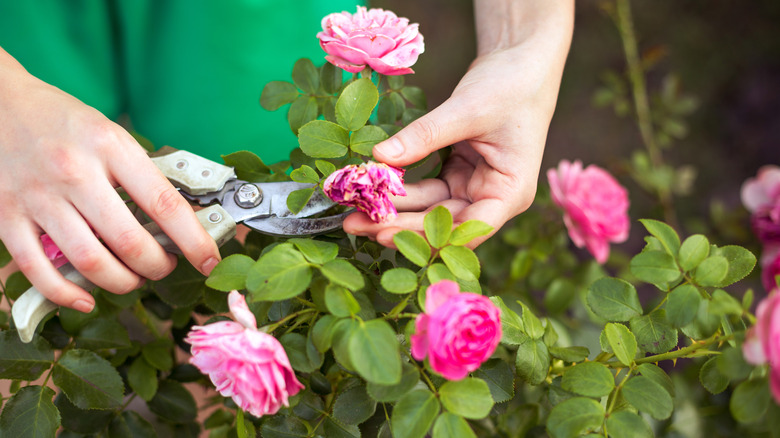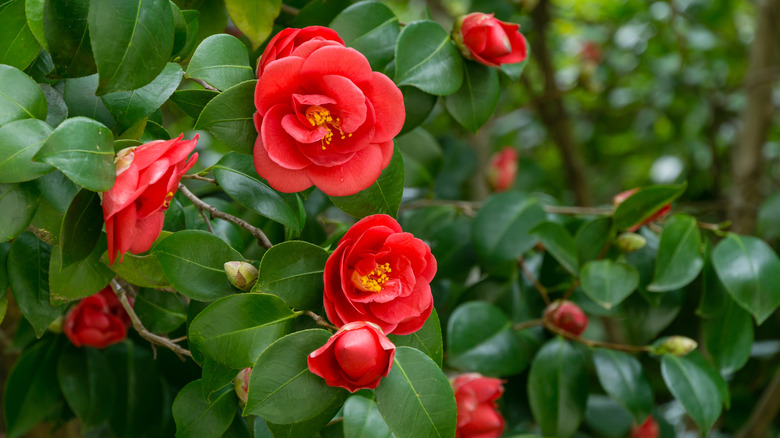How To Keep Pesky Slugs From Snacking On Your Roses
We may receive a commission on purchases made from links.
Let's face it: most gardeners agree on two things. Roses can be tricky to grow, and slugs can be annoying. One aspect of mastering growing roses is learning which pests you must deter and how to eradicate them for good. Slugs, while mostly innocuous and somewhat useful in the garden — decomposing leaves and providing a food source for birds — like to eat rose leaves. The good news is there are a number of relatively easy, inexpensive, and non-toxic ways to keep slugs away from your roses.
Slugs, like snails, are not actually insects but mollusks. They may be slow-moving, but they can do a fair bit of damage. Their snacking can leave unsightly, jagged tears and holes in your rose leaves and sticky, silvery slime trails. They like moist areas, as their bodies are mostly water, and become more prevalent during rainy seasons.
While using any kind of toxic solution is not recommended, some substances will deter slugs from eating your rose leaves and other flowers, and maybe send them to spots in your garden where they won't be as unwelcome (like that little wet pile of oak leaves). The first myth to bust is that dumping salt on slugs is not only rather cruel (it dehydrates them quickly) but doesn't do much in the long run to deter or eradicate them. Try some of these methods instead.
Methods for deterring slugs from eating your roses
If you notice slugs have been nibbling your rose leaves, there are a few different steps to take. First, lightly prune the stems of your roses to remove the damaged leaves. Hand-picking slugs from plants and areas you don't want them in is the least toxic and most humane way to get rid of them. Some gardeners use copper to deter slugs; this metal conducts a mild electric shock that slugs, with their moist bodies, will avoid. You can place a copper ring in the soil by your roses or use copper tape ($12 on Amazon) to wrap around the base of your rose shrubs to help keep slugs away.
There are natural ways to kill slugs also. Adding crushed eggshells to your soil adds beneficial nutrients, and a line of crushed eggshells will also hurt or kill slugs if you pour a line around your roses. Diatomaceous earth will also work in the same way; the powder contains tiny ragged edges that pierce the skin of insects, including fleas.
You can also make a simple beer trap. Using a shallow plastic container, like a yogurt cup, pour in an inch or two of beer, then bury it partway with the opening near the ground surface. This will attract slugs (who love beer) to fall in and drown. If you keep an eye on it, you can remove the live slugs as they enter the trap and remove them before they die.
Preventive gardening to discourage slugs
Before slugs get to your roses, you can do a few things to prevent them from proliferating in your garden. Some of these tips involve addressing excess moisture, as slugs rely on moisture to stay alive and tend to be much more plentiful after rain. Try to be more vigilant during rainy periods to control the amount of slugs in your garden. When they appear, pick them up with gloved hands and remove them.
Keeping mulch layers fairly thin in your rose beds can also help deter slugs. Mulch tends to retain moisture, and slugs will lurk beneath the surface. Using pine straw or long conifer needles as mulch around roses deters weeds as well as slugs. Getting more sunlight and air circulation to your flower beds, particularly near your roses, will help create a drier, less slug-friendly environment.
Another way to keep slugs at bay, which will also increase your garden's biodiversity, is to encourage slug-eating wildlife to visit your garden. Birds that love slugs include finches, robins, starlings, and blackbirds. Other creatures that eat slugs as a regular part of their diet include toads, frogs, small snakes, lizards, salamanders, and ground beetles. Encouraging a balance of wildlife in your garden (predators and prey) can be a good way to naturally keep pests at bay.



